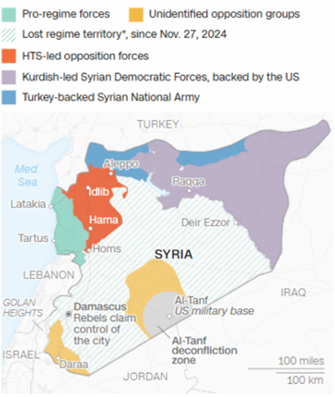10 December 2024 : Indian Express Editorial Analysis
1. A point of no return
(Source: Indian Express; Section: The Editorial Page; Page: 12)
| Context |
|

Rebel Advances and Assad’s Uncertain Future
- The rebel forces’ capture of Aleppo and their recent entry into Damascus mark a turning point in the Syrian conflict, intensifying the uncertainty surrounding President Bashar al-Assad’s fate.
- The loss of his ancestral hometown, Qardaha, further underscores the regime’s diminishing grip.
- For over two decades, Assad maintained power through a mix of authoritarian rule, military loyalty, and external alliances, but these pillars now appear to be crumbling as the conflict approaches its climax.
The Resilience of the Assad Regime
- Assad’s survival since the 2011 uprising in Daraa can be attributed to the stronghold formed by his alignment with the Alawite military and external support from Iran, Russia, and Hezbollah.
- These alliances enabled his regime to endure the Arab Spring and a prolonged civil war. Russia’s military intervention in 2015 bolstered Assad’s position by countering international efforts to resolve the conflict diplomatically.
- However, criticism of Assad’s prioritization of personal power over the country’s welfare alienated him from much of the Arab world, only for Syria to be readmitted to the Arab League in 2023, reflecting the region’s pragmatic shift.
Hezbollah, Iran, and Regional Shifts
- The shifting dynamics in the Middle East, accelerated by the October 2023 Hamas-led attacks on Israel, have further complicated Assad’s position.
- Hezbollah’s involvement in Syria contributed to widespread discontent in Lebanon, already strained by hosting millions of Syrian refugees.
- The weakening of Hezbollah’s influence and Iran’s subdued response to Israeli strikes highlight the diminishing strength of Assad’s key allies.
- Iran’s internal struggles and Russia’s focus on Ukraine further restrict their ability to sustain Assad’s regime.
The Collapse of Assad’s Syria
- As Assad’s regime faces imminent collapse, Syria’s territorial and political cohesion, established post-World War II, is unraveling.
- Bashar al-Assad’s tenure is characterized by the erosion of his father’s legacy of political stability, with the country descending into chaos.
- While the future of Syria and the broader Middle East without Assad remains uncertain, his downfall marks the end of an era, leaving questions about the region’s path to recovery and stability.
| Significance of the Current Syrian Offensive |
|
Strongest Rebel Effort in Years
Regime Vulnerability
Persistent Regional Instability
|
| Practice Question: Critically analyze the factors leading to the decline of Bashar al-Assad’s regime in Syria and assess its implications for the future of the Middle East. (250 words/15 m) |
2. Dignity at the end
(Source: Indian Express; Section: The Editorial Page; Page: 12)
| Topic: GS2 – Social Justice GS4 – Ethics |
| Context |
|
The Complex Debate on Assisted Dying
- The issue of dying with dignity has sparked global debates, as highlighted by the recent passage of an assisted dying bill in Britain.
- Advocates argue that it provides relief from unbearable suffering, citing experiences from Oregon, where cancer patients often seek this option due to a loss of dignity, fear of dependency, and financial burdens.
- However, the ethical, social, and practical ramifications of such laws require a nuanced exploration, particularly as instances of suicide among young cancer survivors rise alarmingly, as seen in recent studies.
The Role and Shortcomings of Palliative Care
- Palliative care emerges as a compassionate alternative to assisted dying, addressing the physical, emotional, and financial struggles of terminally ill patients and their families.
- Yet, its accessibility remains dismal, reaching less than 4% of those in need. Even in the UK, the birthplace of modern hospice care, funding challenges have led to the closure of critical services, revealing systemic neglect.
- Experiences from NGOs like CanSupport demonstrate how comprehensive palliative care can alleviate suicidal intentions and restore dignity in terminal patients, underscoring its potential to transform end-of-life care.
Legal and Ethical Challenges in Assisted Dying
- Countries like India face unique challenges in legislating assisted dying due to societal stratification and potential misuse of such laws.
- Vulnerable populations could disproportionately suffer, as demonstrated by Canada’s experience with Medical Assistance in Dying (MAID).
- Expanding MAID’s scope to include individuals not facing imminent death has raised concerns about the erosion of healthcare quality for vulnerable groups, leading to a legal challenge by disability rights organizations.
- Similarly, the British Medical Association has voiced reservations about laws requiring doctors to facilitate assisted suicide, highlighting ethical dilemmas for medical practitioners.
The Need for Universal Access to Palliative Care
- The rising prevalence of non-communicable diseases and an ageing population necessitate the integration of palliative care into public healthcare systems.
- Beyond providing relief from suffering, it can prevent the societal and ethical pitfalls associated with assisted dying.
- Investing in accessible and affordable palliative care infrastructure is crucial to preempt the growing demand for assisted dying, which could otherwise become a pervasive and misused practice.
A Call for Compassionate and Sustainable Solutions
- The debate over dying with dignity reflects deeper societal failures in addressing suffering.
- Governments and healthcare systems must prioritize palliative care and hospice services to provide patients with humane alternatives.
- Without this commitment, isolated cries for assisted dying could escalate into widespread demands, leading to potentially disastrous consequences, particularly in stratified societies like India.
- The question remains whether we can muster the foresight and compassion to address this urgent issue holistically.
| What are the Provisions of Living Will and Passive Euthanasia in India? |
|
| Practice Question: Critically examine the ethical and societal implications of legalizing assisted dying, and discuss the role of palliative care in addressing end-of-life suffering. (250 words/15 m) |




